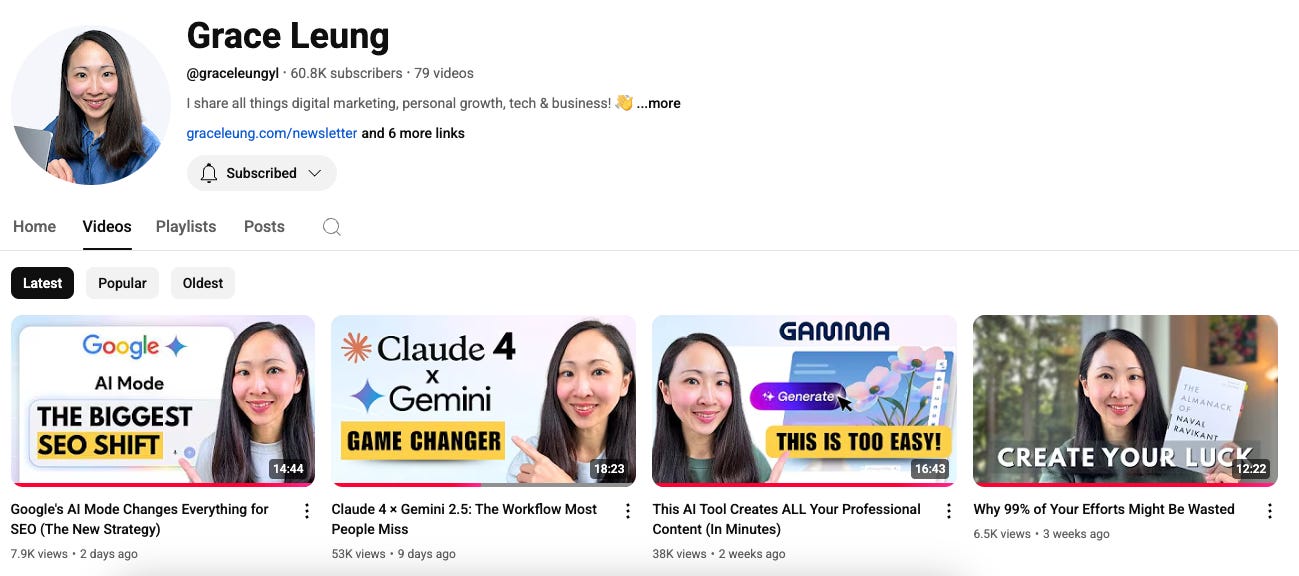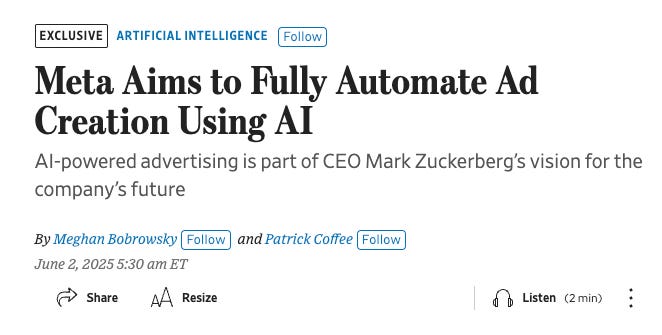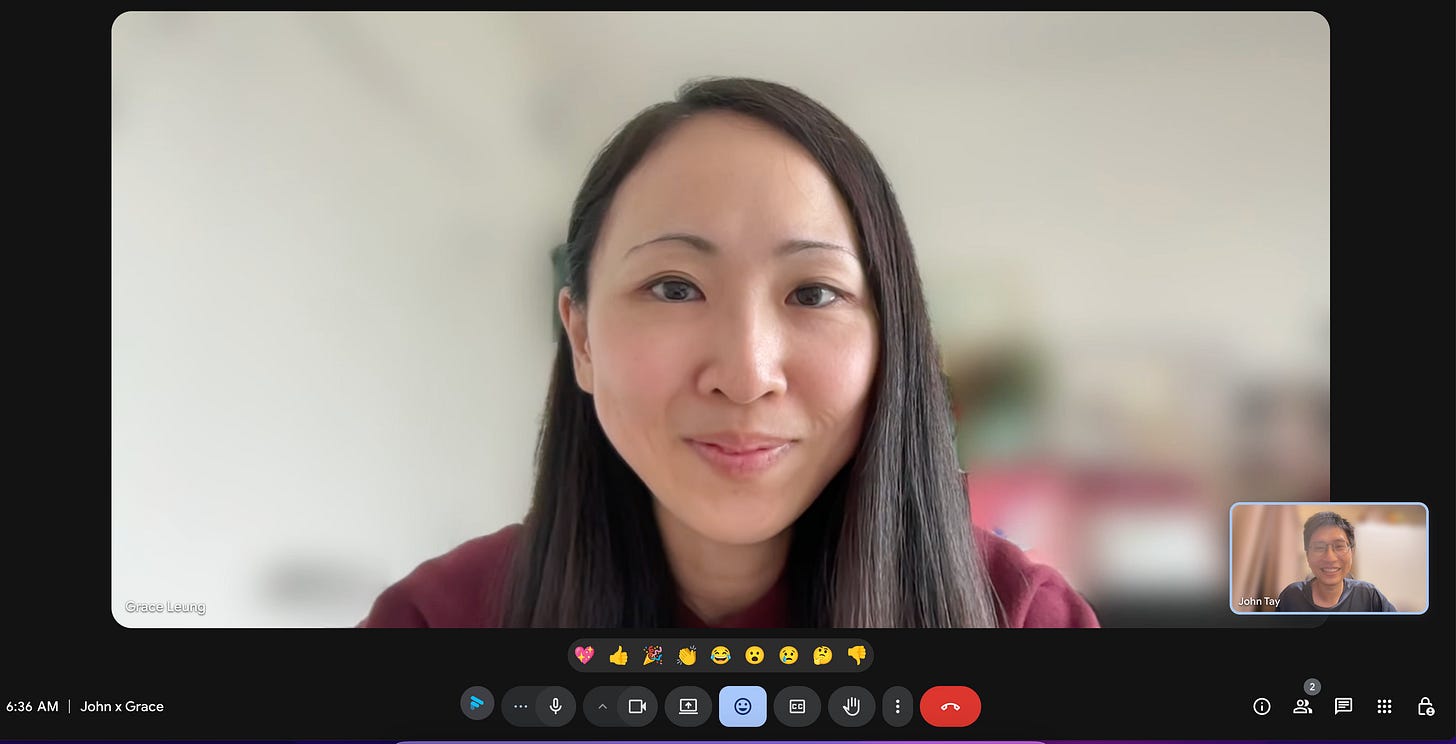AI Is Reshaping Marketing. Here’s Grace Leung’s Brutally Honest Take.
Practical advice from one of YouTube’s top AI educators.
I found Grace Leung’s YouTube channel while trying to level up my AI marketing workflows.
Today, she’s one of the top AI educators on YouTube with 75,000+ subscribers and some of the most practical AI marketing content I’ve seen.

Videos that helped me the most:
This NotebookLM + Perplexity Workflow Will Cut Your Research Time by 50% (or More)
Turn Claude to Powerful AI Agents, Automate 50% of Your Work
I asked Grace for her honest take on what’s really changing and how marketers can adapt and stay relevant.
Question #1: How real is AI really impacting marketing jobs?
It’s very real. AI is impacting every industry and role, not just marketing. But marketing was one of the first to be affected, because so much of it involves content creation and data analysis.
Especially in content marketing and social media, AI can now brainstorm ideas, generate basic drafts, and create high-quality visuals.
Not only do industry research studies show more use of AI in marketing functions, but I see this from my own observations working with brands.
The 3 most impacted areas are:
Content creation - Brands are more aware and actively learning how to incorporate AI in marketing tasks, especially those repetitive and tedious creative design tasks which used to take them hours or rely on external agency’s help. They can now do them in-house. The efficiency gain is so real.
Market research - AI is now heavily being used to speed up market research and collect market data, building quick research reports and gathering sources. This is a real time-saver for most marketers.
Data analysis - AI can be so useful in analyzing data and getting insights faster, and quickly propose hypotheses for spotting opportunities. But this is also an opportunity area where I see a gap at the moment. Brands are not yet structurally utilizing these into their daily workflow, which to me is a big missed opportunity.
Take the example of paid advertising - AI is automating bid management and audience targeting, and marketers can now focus more on other high-impact strategic tasks.
But while AI can speed up lots of groundwork, sound strategy and relationship building need to remain human. For example, digital growth consulting can't simply be done using AI. It takes good judgment to understand what would work best for the brand with its specific growth needs, and this is something AI can't do alone - it requires human experience to make good judgement.
The role of marketers is shifting significantly. The biggest opportunity I see for marketers: Leverage AI to analyze patterns, extract hidden insights, propose ideas, and do groundwork which used to take a big chunk of their time. Then spend more energy on strategy planning and focusing on building a trustable and memorable brand in the AI age.
This transformation is happening in months, not years, especially considering how fast AI is changing.
The future for marketing must be AI + Human.
Question #2: What skill will matter most for marketers to stay relevant with AI?
Besides developing strategic use of AI in marketing, one of the most important skills is good judgment. It will make the biggest difference in a marketer’s career progression.
Good judgment comes from critical thinking, reflection on past experience, active learning, verification skills, and self-awareness - all of which shape your unique way of thinking.
Judgment can’t be easily taught or “simply learned”, it is a skill that takes time and can’t be fast-tracked, which makes it difficult for AI to replicate, as it is built from years of experience, learning, and critical reflection.
The best marketer or smart AI users will be the ones who know when to trust AI and when to rely on their own human judgment.
Anyone can generate professional-sounding AI content or propose a strategy. But only those who can evaluate ‘this part is useful, this part is wrong’ will get ahead.
That’s also why I can’t fully automate my consulting work. AI can handle a lot of prep, but it’s still up to me to make the final call and propose solutions that will actually work for the client in the real world.
Judgement will be also what companies or employers value more, they won’t just value a marketer who knows how to use AI which is a table stakes, but also they value marketers who have their own judgment and are able to judge if AI's suggestions make sense or not while having their own input.
Aside, I recommend readers can check out this video about the critical skills to equip in the AI age to stay relevant:
🧠 John’s thoughts: That’s where strong marketing fundamentals matter. They give you the judgment to know what’s “good” or “bad” in what AI produces.Question #3: How is AI making a real impact in your consulting work?
Since a big part of my role involves organic growth strategy consulting, these are 3 specific ways that AI is making a real impact.
1. Research acceleration for strategy development
What used to take me weeks of market research and competitor analysis now happens in days. Most AIs have deep research features that pull out market data to synthesize insights, so this is a huge time-saver for me to focus more on delivering more comprehensive strategy recommendations faster.
And again, a good strategy needs good judgement, so this is something still can’t be outsourced completely to AI.
2. Content strategy
AI has unlocked the ability to help clients to build their content strategy faster by fast-tracking competitor insights and unlocking deeper audience insights.
And not just content strategy, but also the actual content creation, where some of my clients are using more AI in their social media content creation e.g. generating video voice over, building content drafts which had significantly saved up their time.
3. Data interpretation and actionable insights
AI helps me quickly identify patterns in all sorts of data: market data, client performance data..etc that would take hours to analyze manually.
I can spot content gaps, seasonal trends, and optimization opportunities much faster, leading to more targeted and effective growth strategies.
So what used to be 80% research and 20% strategy is now flipped - AI handles the groundwork so I can focus on the strategic thinking that actually moves the needle for clients.
🧠 John’s thoughts: Using AI for marketing research has been the biggest time unlock for me. What used to take weeks now happens in days or even hours.Question #4: How do you use AI in your YouTube content workflow?
What AI truly helps with is the content research process, which used to take me a lot of time. Tools like NotebookLM and Perplexity now help me quickly build a basic understanding of new AI topics by gathering different sources.
AI changes too fast to keep up with everything. Before, it took much longer to understand new concepts. Now with AI, I can build understanding much faster, then focus more on hands-on testing and verification.
Also, it allows me to understand what are the common areas that are being talked about in a specific topic, which I can identify any content gaps much faster than manual research and find unique angles to differentiate.
This is similar to SEO and content optimization, but AI takes the process to another level.
I do use AI like Claude to build content, outline draft or propose ideas like video titles, but again, 99% of the time the draft will still need to be revised and enhanced, as AI won’t have the same judgement as you, so this is a process that highly involves AI + humans in order to create truly distinctive and outstanding content.
I have built different projects on Claude to do specific repetitive tasks for my content creation process, e.g. drafting thumbnail ideas, descriptions, which save me time in building the first draft, while I can always enhance and fine-tune based on the initial drafts.
My advice for new creators?
Start by using AI to help with research and initial content structuring. Using AI to speed up your background research on content topics that are already resonating with your target audience in your niche.
Pick some of the biggest or greatest creators and study them with AI, what are the chosen topics, the content gaps, their audience comments that indicate what they like or dislike, what are the success patterns? Anything you can learn from them?
Use your own critical judgement to make the final call, never just rely on AI generated insights, and always have your unique insights and aim to develop your own style.
Question #5: What are your top 5 AI tools for marketing?
I personally have a minimal AI tech stack and I intentionally keep it lean, because more tools only make the outcome less effective, particularly when now most AI are becoming more powerful with more advanced features. Some of the top used AI right now:
Claude - My go-to for strategic thinking and complex content development. Best at helping structure ideas, doing precise analysis, refining content angles, and providing nuanced feedback. Claude is also excellent in doing strategic analysis for both content and client projects with attention to details.
Perplexity - Essential for real-time research and market data collection. It helps to speed up the initial content research process a lot, especially when it comes to some new AI or tech concept I am not familiar with or when some big enhancements in an AI model are announced. It’s also perfect for gathering current trends and competitor insights with sources.
Gemini: I started using Gemini more since the significant upgrade to their Gemini 2.5 Pro, from which I have gotten some great results for all kinds of marketing or research works besides Gemini deep research (it's a really smart model!). Gemini also keeps adding capabilities like building, and integrating with other Google products, which is a huge plus for me. I also use it to analyze large datasets or codesets as it has a 1M-token context window, which has been a great help for my strategy work.
ChatGPT: I use it whenever I need a second opinion, and I mainly use the reasoning models. ChatGPT's reasoning model is exceptionally logical, and it can be useful for providing subjective analysis, especially when matters are important.
NotebookLM - Underrated gem for content synthesis. I use it alongside Perplexity, and what I like about NotebookLM is the minimal hallucination compared to other AI tools, making its insights more reliable. I can make sure the insights are gathered only from the quality sources I defined. Great at taking multiple research sources and identifying patterns or initial talking points. Most people overlook this but it's incredibly useful for deep content development and for SEO analysis as well.
N8n - a trending AI workflow optimization tool that I am increasingly using lately to automate some repetitive processes and make more high-impact workflows.
My advice is always focus on your needs and biggest pain points first, and not just those trending AI tools that you’re using because of FOMO.
You don’t have to develop super sophisticated or a list of AI tools to make the process efficient. Always keep things simple, reliable and start with just one biggest problem first before scale.
🧠 John’s thoughts: Totally agree on the FOMO. I used to want to try every AI tool out there. Now I stick to four or five that solve specific problems in my marketing stack.Wrap Up: What Will Set You Apart
The future of marketing is not about using more AI tools.
It is about using them well with judgment, strategy, and a clear point of view.
And that’s what Grace’s message really comes down to: AI is a tool. You are the difference.
Thanks Grace! For this opportunity to speak with you.
I test AI workflows on real marketing problems.
And turn the useful ones into 10x Playbooks.
So business owners and solo marketers doing it all themselves can skip the guesswork… and copy what actually works.
→ I drop one of these 10xPlaybooks 🚀 every week, don’t miss the next.
John




This is definitely useful for me, John. Currently, I have a plan to improve my research skills with AI, and this guide contains some good material for me.